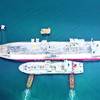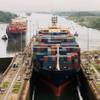Qatar Gas Transport Company (known as “Nakilat”, which means carriers in Arabic) recorded its financial results for the first half of the year ended June 30, 2017 with a net profit of QR 409 million ($112 million) compared to QR 501 million ($137 million) of the same period last year in 2016.
The lower profit was mainly attributed to the lower number of charter hire days in the current period compared to the same period last year (2016 was a leap year), the effect of changing the estimated scrap value of vessels in accordance with applicable International Accounting Standards and the reduced operations of a few joint ventures. On the other hand, the company’s timely repayment of the periodic loan instalments resulted in reduced finance costs.
Nakilat Managing Director Eng. Abdullah Fadhalah Al Sulaiti said, “Nakilat perseveres despite the current economic environment through its steady growth in all its operations. The first half of 2017 has seen successful transitions of four vessels into Nakilat in-house management, bringing total vessels operated by Nakilat to 16 vessels to date. This further showcases our readiness to grow while strengthening in-house capability."
"Just recently, Nakilat signed a Memorandum of Understanding (MoU) with Hoegh LNG, forming a strategic alliance to explore Floating Storage and Regasification Unit (FSRU) project. This collaboration is a strategic move for Nakilat as we are always looking at opportunities to venture into leading-edge technologies and diversifying solutions to deliver clean energy worldwide, which further strengthens Qatar’s position in the energy portfolio,” he added.
Al Sulaiti continued,“We continue to assess our current investments in relation to profitability in order to address any risk involved for the company and its shareholders. Although Nakilat anticipates continued challenges, we remain focus on effective and efficient measures of control to steer the company forward. This comes in view of Nakilat’s vision to be the global leader and provider of choice for energy transportation and maritime services, which ultimately contributes to the development of an integrated maritime industry in Qatar.”










